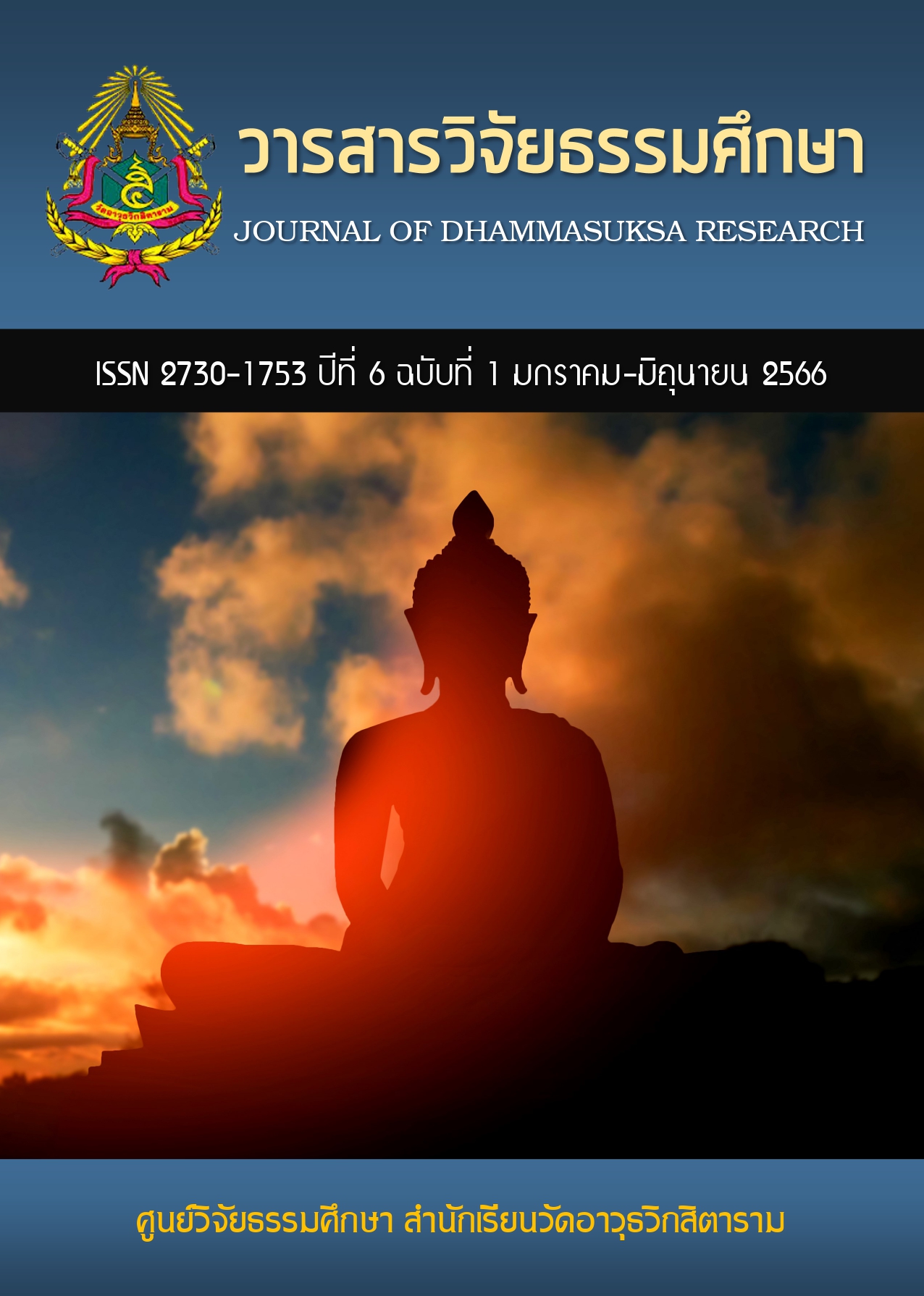The Buddhist Philosophical Paradigm of Awakening for Strengthening Happiness in the Postmodern Society
Keywords:
Buddhist Paradigm, Philosophy of Awakening, Strengthening Happines, Postmodern SocietyAbstract
The objectives of this research paper were to: 1) study the philosophical paradigm of awakening for strengthening happiness in the postmodern society; 2) study the Buddhist philosophical paradigm of awakening; 3) integrate the Buddhist philosophical paradigm of awakening for strengthening happiness in the postmodern society; 4) create a new body of knowledge and model of integrating the Buddhist philosophical paradigm of awakening for strengthening happiness in the postmodern society. This research was a qualitative one based on documentary research upon the analytic, appreciative and applicative approaches so as to lead to the creativity of new body of knowledge in philosophy and religion.
The results of research were found as follows: The awakening development of humankind from premodern, modern and postmodern society has contributed to progress many benefits, as the same time, affected to live life in the digital society concerning the victim 0f consumerism until causing the problems of moral, education and coexistence in society. The Buddhist philosophical paradigm presented in metaphysics on the Three Common Characteristics, in epistemology on the process of wisdom and in ethics on morality, wholesome course of action and the Noble Eightfold path including the Threefold Training. Such integration of the Buddhist philosophical paradigm of awakening for strengthening happiness in the postmodern society is the living with wisdom, living life carelessly in lifestyle, age and situation change by the proceeding life based upon the Middle way, being sensible, critical thinking reasonably, awakening to scrutinize things as being good or bad, something valuable or no value, benefit or no benefit according to reality, receiving information as much as necessary and helpful. As for the creativity of new body of knowledge on this research is MWLJH.
References
จำลอง ดิษยวณิช และพริ้มเพรา ดิษยวณิช. (2547). ภาวะสุขภาพจิตกับการเจริญวิปัสสนากัมมัฏฐาน. กรุงเทพฯ: บริษัท บุญศิริการพิมพ์ จำกัด.
ประพัฒน์ ศรีกูลกิจ. (2557). จิตวิทยาในพระไตรปิฎก. พิษณุโลก: บริษัท โฟกัส ปริ้นตี้ง จำกัด.
.(2559ก). จิตวิทยาแนวพุทธ. พิษณุโลก: บริษัทโฟกัส ปริ้นติ้ง จำกัด.
ประเวศ วสี. (2563, [ออนไลน์]). เข้าถึงที่ www.ruchareka.wordpress.com/tag/การตื่นรู้. สืบค้น เมื่อวันที่ 2 เมษายน 2563.
พระครูปลัดสุวัฒนเมธาคุณ (ชัยยันต์ สืบกระพันธ์). (2555). บูรณาการหลักพุทธจริยศาสตร์ในการดำเนินชีวิตของคนไทยในสังคมปัจจุบัน. ดุษฎีนิพนธ์ศาสนศาสตรบัณฑิต, สาขาวิชาพุทธศาสน์ศึกษา, บัณฑิตวิทยาลัย, มหาวิทยาลัยมหามกุฏราชวิทยาลัย.
พระนราศักดิ์ วรธมฺโม. (2564, เมษายน-มิถุนายน). พุทธจริยศาสตร์ในการพัฒนามนุษย์. วารสารบัณฑิตศึกษามหาจุฬาขอนแก่น. 8 (2): 27-39.
มหาจุฬาลงกรณราชวิทยาลัย. (2539). พระไตรปิฎกภาษาไทย ฉบับมหาจุฬาลงกรณราชวิทยาลัย. เล่มที่ 11, , 20, 21, 31. กรุงเทพฯ: โรงพิมพ์มหาจุฬาลงกรณราชวิทยาลัย.
วิกรม กรมดิษฐ์. (2555). คาถาชีวิต. กรุงเทพฯ: บริษัท พริ้นท์ ซิตี้ จำกัด.
วีรณัฐ โรจนประภา. (2561). การนำกระบวนทรรศน์ปรัชญาหลังนวยุค และพุทธปรัชญามาสร้าง สังคมแห่งสัมมาปัญญาในประเทศไทย 4.0. ดุษฎีนิพนธ์หลักสูตรปรัชญาดุษฎีบัณฑิต, สาขาวิชาปรัชญาและศาสนา, วิทยาลัยปรัชญาและการศึกษา, มหาวิทยาลัยเซนต์จอห์น.
สุเมธ เมธาวิทยกุล. (2540). ปรัชญาเบื้องต้น. กรุงเทพฯ: โอเดียนสโตร์.
Additional Files
Published
How to Cite
Issue
Section
Categories
License
Copyright (c) 2023 Journal of Dhammasuksa Research

This work is licensed under a Creative Commons Attribution-NonCommercial-NoDerivatives 4.0 International License.



